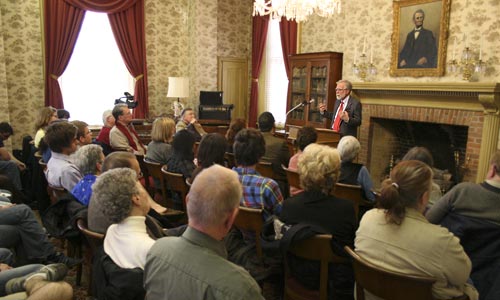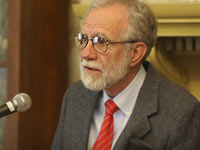

Venture Boldly

Office of Communications
2 East South Street
Galesburg, IL 61401


Under the watchful eye of Abraham Lincoln's portrait in the Alumni Room at Knox College,
Douglas Wilson discusses Lincoln's political language.
According to some scholars, Thomas Jefferson was first writer to use "belittle" in its current meaning; as in: "When Abraham Lincoln was elected president in 1860, many people belittled his ability with language."
Douglas Wilson, co-director of the Lincoln Studies Center at Knox College, has extensively studied both Lincoln and Jefferson. In "Lincoln and Language," the 2009 Burkhardt Lecture, April 2 at Knox College, Wilson argued that while Lincoln was a close reader of Thomas Jefferson's writings, Lincoln made a deliberate choice not to imitate Jefferson's erudition in his mature political language.
"Belittle" is the kind of Jeffersonian vocabulary that Lincoln would not have used as President, Wilson said.
![]() "Lincoln and Language" lecture and Q&A session
"Lincoln and Language" lecture and Q&A session
Lincoln "wanted to make himself understood by all classes... he wanted to be distinctly understood by common people," Wilson said. Journalists of the day, expecting to hear the flowery prose used by 19th-century politicians, termed Lincoln's speech "peculiar," Wilson said. In an era of eloquence, Lincoln developed "a discourse of plain language."
Lincoln, Wilson said, told a friend that he wasn't satisfied until people had explained their ideas in plain language. Or, as Lincoln told his long-time law partner, William Herndon, "if you want to change the minds of farmers and storekeepers, you have to speak their language."
Wilson said that Lincoln developed his plain style as he grew into his political career.
Wilson read an excerpt from one of Lincoln's early political speeches, his 1838 "Lyceum Address" in Springfield: "... Their's [the founders of the United States] was the task, and nobly they performed it, to possess themselves, and through themselves, us, of this goodly land; and to uprear upon its hills and its valleys, a political edifice of liberty and equal rights..."
Thanks to a word-by-word index of all Lincoln's speeches, we now know that the Lyceum Address "was the last 'edifice' that Lincoln would 'uprear'," Wilson said. "Certain words, such as 'bane' and 'prattle' and 'uprear,' were banished from his vocabulary."
 "Uprear" -- for example -- is found in "Childe Harold's Pilgrimage," an early 19th-century poem by Lord Byron which Lincoln had studied, Wilson said. "Lincoln's vocabulary was built up from his reading" -- especially the Bible, Shakespeare and English poetry, such as Byron. But as he matured politically, "Lincoln shed the words that attracted him early in his career."
"Uprear" -- for example -- is found in "Childe Harold's Pilgrimage," an early 19th-century poem by Lord Byron which Lincoln had studied, Wilson said. "Lincoln's vocabulary was built up from his reading" -- especially the Bible, Shakespeare and English poetry, such as Byron. But as he matured politically, "Lincoln shed the words that attracted him early in his career."
Within just two years of the Lyceum Address, Wilson said, Lincoln's speeches show "a forceful and direct language... an absence of the 25-cent words."
Although he used a plain vocabulary, "Lincoln did not intend to sacrifice persuasiveness," Wilson said. "Lincoln's best writings show use of rhetorical devices" that have been around since ancient times. "The [270-word] Gettysburg Address has 13 alliterations..."
Wilson said that Lincoln's writing was "related to the extraordinary cultural and literary ferment of the 1850s," a decade in American literature that produced Melville's Moby Dick, Hawthorne's The Scarlet Letter and major works by Henry David Thoreau, Walt Whitman and Emily Dickinson.
Wilson is the author or co-editor of several award-winning books on Lincoln and co-director of the Lincoln Studies Center at Knox College. Among his many published works is the book Lincoln's Sword: the Presidency and the Power of Words, and the article "What Lincoln and Jefferson Read," a cover story for The Atlantic. The Burkhardt Lecture is an annual talk in the field of history, often by a member of the Knox College faculty.
Published on April 10, 2009